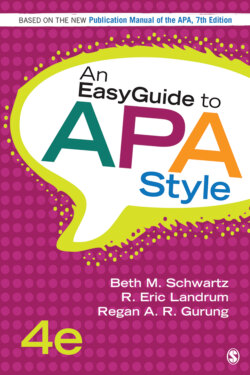Читать книгу An EasyGuide to APA Style - Regan A. R. Gurung - Страница 27
На сайте Литреса книга снята с продажи.
Parts of a Sentence
ОглавлениеTexas No Limit Hold ‘Em is a card game with its own terminology that must be learned to play—it includes terms such as the flop, the turn, the button, big slick, and trips. If you did not understand those Texas No Limit Hold ‘Em terms, you would have a hard time just following the game (much less playing it). The same is true for grammar terminology. If you do not know what the terms mean, then it will be difficult to apply any rules. So we start here with parts of a sentence. By the way, many of these explanations come from Maddox and Scocco (2009), who provide a wonderful resource on basic English grammar, available online as a PDF. Next up will be parts of speech, followed by grammatical errors you want to avoid.
Subject: The part of a sentence that is being written about.
The researchers studied the effects of Alzheimer’s disease. (The subject is “researchers.”)
Predicate: What we say about the subject of the sentence. (The main word in the predicate is the verb.)
I hypothesize that younger adults spend more time on Facebook than do older adults. (The predicate is “hypothesize.”)
Phrase: Grammatically related words of a sentence that do not contain the main verb (a sentence fragment that would not exist as a sentence on its own).
I attended the session at the conference on applying to graduate school. (Both “at the conference” and “on applying to graduate school” are phrases—written alone, they would not stand as sentences.)
Clause: Grammatically related words that do contain a main verb. An independent clause is part of a larger sentence that could stand on its own as a complete sentence. A subordinate clause cannot stand on its own as a sentence because the clause begins with a qualifier, such as “because” or “when.”
I want to take statistics, unless the class time conflicts with my work schedule. (“I want to take statistics” is an independent clause because it can stand on its own as a complete sentence. The second clause, “unless the class time conflicts with my work schedule,” is a subordinate clause because of the qualifier “unless.”)
Object: The part of the sentence that receives the action of the action verb.
I completed an application to graduate school. (The object of the sentence is “application,” which is the receiver of the action of the verb “completed.”)
